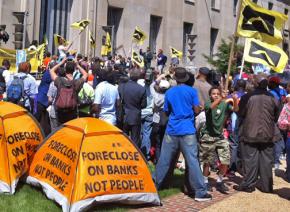Foreclosure victims send message of protest
travelled with other housing justice activists in Atlanta to Washington, D.C.,--and reports on their calls for action on the steps of the Justice Department.
HOMEOWNERS FACING foreclosure and eviction from across the country gathered in Washington, D.C., last week to demand that the Justice Department begin prosecutions against the bankers who created the foreclosure crisis.
Seniors and communities of color were targeted for predatory loans during the housing boom, yet not one banker has been jailed. Wall Street gambled with pension funds and home equity, and not one of those responsible has been brought to justice. Instead, they've been handed taxpayer money in the form of bailouts--and returned to record profitability.
So Occupy Our Homes, the Home Defenders League and others decided to give a wake-up call to the Department of Justice, saying, "Too big to fail is NOT too big to jail!"
Hundreds of homeowners, activists and allies gathered May 20 to bring attention to the victims of these bankers' crimes. People facing foreclosure came from Georgia, Oregon, California, Minnesota and beyond to make their voices heard. They marched from Freedom Plaza to the Department of Justice and, in the words of the Washington Post, "stormed" the building--climbing the barricades erected to block the entrance.

As hundreds of occupiers took over this entrance, police vanished from sight, presumably hoping to de-escalate the situation. Protesters climbed the statues by the door, decorating them with tents that had been painted with "Foreclose on Banks, Not on People." Couches were moved onto the steps of the entrance and a short prayer circle was led by a minister facing foreclosure.
The action escalated as protesters took the 9th Street and Pennsylvania Avenue intersection and blocked traffic for almost half an hour. After reclaiming the original entrance, police, apparently deciding that protesters would not leave of their own accord, arrested 17 people.
If police thought this would intimate the crowd, they were wrong. Activists camped out until morning, at which point all who remained at the Department of Justice were arrested. During the course of the protests, several people were Tasered by police without warning. Among them was Atlanta foreclosure fighter Carmen Pittman.
Housing justice actions continued for the next few days. Protesters occupied space at Attorney General Eric Holder's former law firm and more arrests occurred. Many arrestees refused to give their names, and instead gave the police the names of the Big Banksters to highlight who should be in jail.
AS PART of the delegation from Atlanta, this protest really hits home. As of January of this year, Georgia's foreclosure rate is fourth in the nation. Around one in forty homes is facing foreclosure in 2013.
The metro Atlanta area is especially hard hit, with 3.51 percent of all homes facing foreclosure, according to RealtyTrac. A new study by Alliance for a Just Society indicates that Atlanta has lost $902 million dollars of wealth from the housing crisis.
According to the 2010 Census, some 60 percent of the city consists of overwhelmingly Black neighborhoods, meaning that Black homeowners are disproportionately hit by the ongoing housing crisis. Further highlighting the racist nature of this crisis, according to the Just Society report, communities of color had a foreclosure rate almost twice that of segregated white communities.
Carmen Pittman's story says it all. Her entire extended family lived in a house on Glen Iris Avenue in a neighborhood in Atlanta that has been targeted for gentrification. Her elderly grandmother, who had owned her home outright, was targeted for a predatory loan. As Carmen's grandmother lay on her deathbed, JPMorgan Chase harassed the family about payments.
After her grandmother's death Carmen had to take up the fight. After a full year of protests, actions (including civil disobedience) and negotiations, Carmen won the family's home back from Chase. But it was only the struggle and the connection to the Occupy movement that gave Chase a reason to give in. Carmen is a reminder that if we fight, we can win; if we don't we will always lose.
That fighting spirit was palpable in the crowd in Washington. Dozens of those like Carmen were ready to sacrifice their freedom to try to force some accountability from a rotten system.
We need a system that puts Carmen's family before JPMorgan Chase CEO Jamie Diamond's pocketbook.


